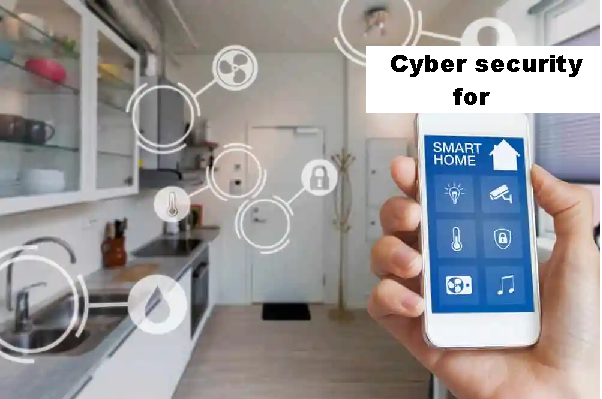Cybersecurity for Smart homes
The act of using digitized Software to secure homes from malicious attacks from penetrating into the smart homes is what is called cybersecurity for smart homes. In Recent times, people have adopted the use of smart home devices. For example we have thermostat that regulate temperatures of a water, using a voice command to switch on the light, and digital devices to change the way we live. Furthermore, as homes get smarter, the more the risk of theft. So therefore, cybersecurity is very important to protect the digital devices in our home. In this article, i state the importance of cyber security in our smart homes and as well state practical tips to secure smart home that is connected to the internet.

What are Smart Homes?
Smart homes are places equipped with digital devices that are connected to the internet by monitoring and controlling it remotely. Examples of devices that makes the home smart are monitoring cameras, thermostat, voice – activated assistance such as Amazon Alexa or google assistant, door bells and light etc.
The cybersecurity Risk of having a Smart Homes
Imagine a hacker, who hacks into your home security camera or having un-authorised access to your smart locks. The allow s breach of security or someone compromising into your privacy which can lead to physical attack which endangers our life.
What is cybersecurity?
Cyber security is the process of securing or defending computers, servers, network, mobile devices, electronic systems and data from cyber threat or malicious attacks.
How can I make my smart home more secure?
To make your smart home more secure from theft or un-authorised access. furthermore, You need to apply the following cyber security tips. Below are sure and trusted tips to secure your smart home
- Secure your Wi-Fi network
Using a very strong password most especially with a password. That contains symbols, numbers and alphabet all combined gives a strong password. With this a hacker cannot manipulate your Wi-Fi network and enable a WPA3 encryption security.
- Change Default Passwords
Change the default password that comes with the device to a more complex password, just as I stated above. So hackers finds it very hard to manipulate your smart honme devices.
- Regular Updates
Always update your device and its software with recent security regularly to fix security vulnerabilities.
- Enable Two-Factor Authentication (2FA)
This enables an additional layer of identification to your device. So therefore, this one of the the best ways to secure your smart home. For example after inputting your password, there is an additional passcode sent to the device to authorise authentication.
- Create a Separate Network for Smart Devices
Create various segments of network to isolate each devices in your home. By so doing it adds an additional protection to the device security.
- Review App Permissions
Permissions needed are only access needed for the software or device to function. So therefore limit permission access to your smart home device.
- Purchase a Quality Router
Buy an original and a large router that has a built-in security features that has a strong defence against cyber vulnerability or threat.
What are the cybersecurity concerns of smart homes?
- Protecting Personal Privacy
Smart home devices collate and store data in the cloud or cyber space. A cybersecurity makes sure this sensitive information is not given out to an unauthorised user.
- Preventing Unauthorized Access.
Hackers wants to exploit vulnerabilities in the smart home device to get unauthorised access to home network. Securing your device unauthorised control and monitoring.
- Safeguarding Against Malware:
Malicious programs can breach the functioning of your smart home device. Administering the use of cybersecurity helps to protect against any theft or malicious attacks.
- Mitigating the Risk of Device Manipulation:
Cybersecurity measures to protect against malwares attacks for smart home devices. For example hackers tampering with lock door device to penetrate into your home.
How does smart home security work?
This is how a smart home security majorly works in various homes. Various components are connected for a smart home security to work. The following are needed, to ensure a smart home security works.
- Components
For a smart home security to work, it needs a network of interconnected device to communicate. For example motion sensors, door sensor, camera, smart locks, control panel or central hub
- Central Control and Monitoring:
The central hub or panel serves as the brain of the system that connects all devices together, in other for them to communicate or signal each other when necessary .users controls the system using mobile phones, computer interface or control panel.
- Integration and Connectivity:
The devices are controlled through a control panel over a wireless network . Through Wi-Fi, Zigbee, Z-wave or Bluetooth.
- Sensors and Triggers
A sensor detects different actions such as door/window openings, motions, fire outbreak, and temperature changes. When the sensor senses any trigger, it then sends a signal to the control panel and executes a programmed action.
- Alerts and Notifications
Once an event is noticed, the system produces an alert in alarms or notification. And displayed on the user’s phone or alerting a professional monitoring service to take fast actions.
- Automation and Integration
Smart home security system are integrated with other devices in the smart home. For example a light turns on when there is a movement detected. Or a thermostat adjust according to the security command.
- Encryption and Security Measures
To prevent data breach or intrusion on data privacy or prevent unauthorised access, smart homes uses code encryption protocols and security rules to protect data and device communication.
- Customization and Settings
End users can customise the device settings according to a specific need. such as adjust sensor responsiveness or plan schedules to arm/disarm triggers or create an action based on a particular type of trigger.
Conclusion: cyber security are needed in all smart homes to prevent hackers, from unauthorised penetration into the smart home devices.
